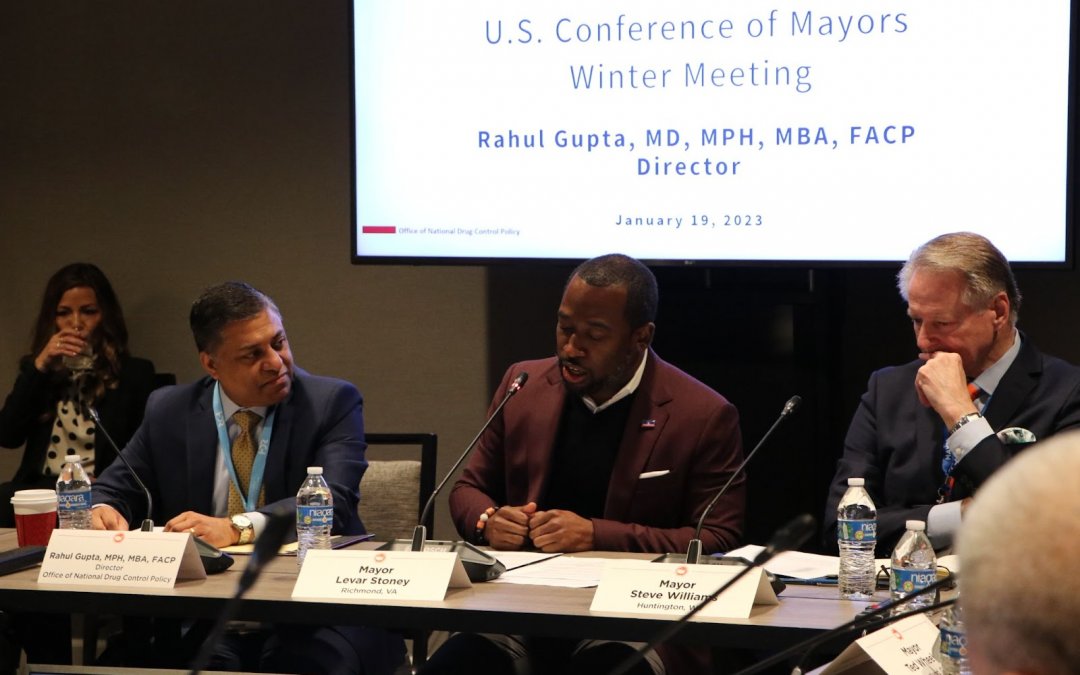WASHINGTON –– More people have died from opioid overdoses than during the Vietnam War, Levar Stoney, mayor of Richmond, Va., decried Thursday at the United States Conference of Mayors here. Yet federal funds for cities looking to tackle the epidemic can be hard to come by.
“The U.S. Conference of Mayors is committed to fighting the opioid overdose epidemic and supporting all of you as you continue to work to identify outbreaks, collect data responding to overdoses, and provide care to those in need of help in your cities,” said Stoney, who led a discussion on strategies to address the crisis.
In Richmond, overdose deaths more than doubled between 2017 and 2021. To tackle that epidemic, Stoney helped create a $5 billion fund to address health equity issues. The money came from the American Rescue Plan Act, President Biden’s $1.9 trillion economic package passed in 2021 aimed at pandemic recovery.
One of the programs funded by the trust helps formerly incarcerated individuals, distributing Narcan and fentanyl testing strips to clients.
“They use their grants to educate all of their participants about the impact of opioid use in our communities,” he said. “It is this type of attention and intentionality that, with wraparound services and support, we must offer to help lift up our folks with a history of substance use and get them on a path to thriving.”
Cities around the nation are struggling to develop similar programs with several mayors saying that federal funding is not easily accessible to them. But there are federal programs that can help provide money to address opioid use, Rahul Gupta, director of the Office of National Drug Control Policy told the mayors.
Gupta highlighted the High Intensity Drug Trafficking Area Program, which sends federal law enforcement into cities, as well as the Drug Free Communities Program, which establishes call centers and other “delay methods” to keep youth away from addiction.
“When we look at this president, it’s very clear that it (the opioid crisis) is one of his top priorities,” Gupta said. “And we’ve got to address the drivers of this epidemic –– that’s untreated addiction, and it’s drug trafficking problems.”
The stimulus plan also directed the Department of Health and Human Services to provide $3 billion in block grants to address addiction and mental crises.
Though Richmond was able to channel some federal stimulus funding into an opioid-prevention program, other cities are struggling to obtain federal funding that is not distributed directly to their cities.
“The more you send your money to the state, the less it’s going to get to the cities,” Acquanetta Warren, mayor of Fontana, Calif., said.
Warren said state governments are not as close to the crisis as mayors are. Gupta added that many states have invested money into tackling the opioid crisis.
The Biden Administration is working on creating federally-funded prevention programs that cities can more easily utilize, Gupta said. The federal anti-trafficking program, a $300 million endeavor, is increasingly turning toward prevention programs.
The Office of National Drug Control Policy is starting to invite applications for the anti-trafficking program’s discretionary funds, encouraging cities to create programs that work for their jurisdictions.
“Last year we lost over 107,000 Americans,” Gupta said. “That’s a person losing their life every minute of every hour of every day. These are sons and daughters. These are family, friends, neighbors, teachers, that are not coming back.”

